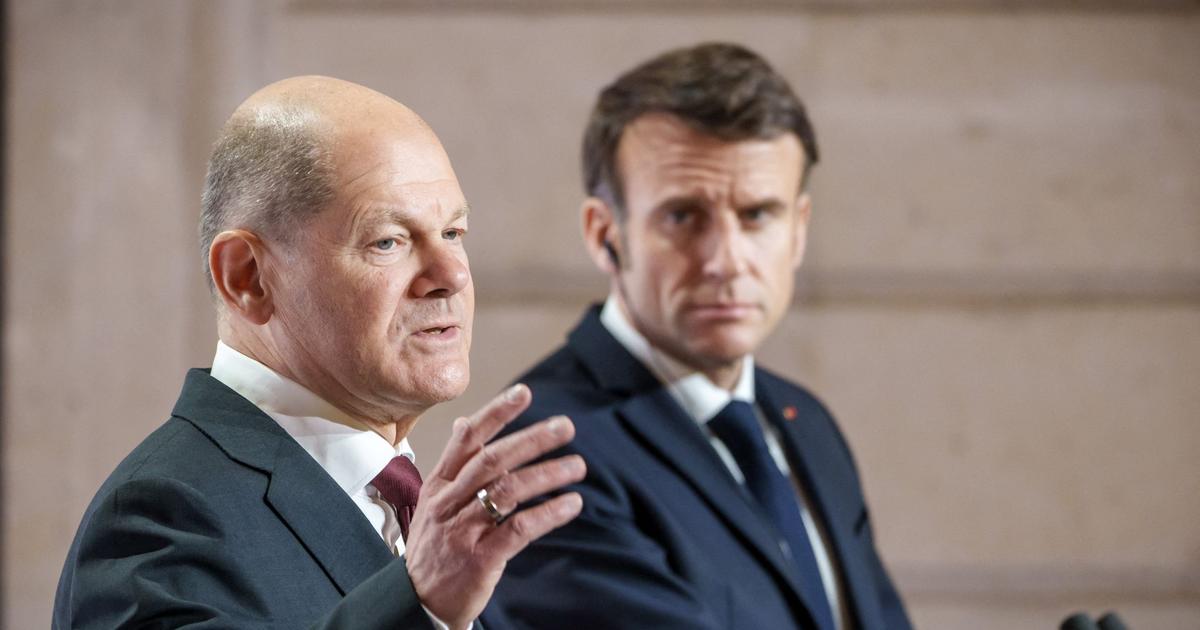Pierre Avril (in Berlin) and Anne Rovan (in Brussels)
To discover
- Follow the news about the war in Ukraine with the application of Le Figaro
"As soon as possible." In Bratislava on Wednesday, Emmanuel Macron laid the foundations for a rapid entry - at least as quickly as possible - of Ukraine, Moldova and the countries of the Western Balkans into the European Union (EU). The president is making an important shift here. Just one year ago, on 9th May 2022, before the European Parliament, he stressed that Ukraine's accession to the EU would take "decades"... Doubting the hopes of Kiev, which considers that entry into the Union - as in NATO - is vital.
Emmanuel Macron was then very cautious. While Russia continues the war and continues to increase the pressure on the countries on the eastern flank of the continent, he now believes that there cannot, in this context, be grey areas in Europe. If the wait for these countries is too long, "I think that in fact, we will give more space to all those who want to destabilize Europe within it and I think we will wake up in a few years with a situation that will have largely deteriorated," he admitted in Bratislava, while calling for "inventing several formats" and "clarifying the purposes of each of these formats." . For the Élysée, it is necessary to start thinking about this question of how, while the Twenty-Seven must decide at the end of the year on the opening of accession negotiations for Ukraine and Moldova.
"We want to start discussions this year and continue them next year," Volodymyr Zelensky repeated last week, hoping that his country will partially access the European internal market next year. As for the Moldovan government, it aims for full membership by 2030. A deadline on which Emmanuel Macron was careful not to commit last week, during the second summit of the European Political Community, in Chisinau.
EU enlargement will be on the agenda of a working dinner between the president and Olaf Scholz on Tuesday in Potsdam, aimed at preparing for the president's state visit to Germany in early July. The Chancellor, for his part, is very cautious. "The conditions for membership are the same for all," replies Olaf Scholz traditionally, who carefully refuses to mention any free pass likely to favour Ukraine over the other candidate countries. Especially since, alongside Kiev's candidacy, there is the question of the accession of the Balkans. Berlin does not want the latter to bear the brunt of the new security situation generated by the war, while Paris now seems to be rallying.
Speeding up the Ukrainian file
The five candidate countries of the Western Balkans "have been waiting for twenty years for this promise (of membership, editor's note) to materialize," recalled Olaf Scholz at the Chisinau summit, placing particular emphasis on North Macedonia. In addition to the Russian-Ukrainian conflict, recent communal tensions in the Serbian compound of Kosovo have alarmed Berlin, which is also concerned about the influx of migrants transiting the Balkan route. Like Emmanuel Macron, Olaf Scholz wants to lead a debate on the reform of the Community institutions capable of accompanying the process. During a speech in Prague last summer, and then before the European Parliament recently, the Chancellor had notably advocated the introduction of qualified majority voting for European decision-making in foreign policy and taxation. His caution with regard to the Ukrainian issue should not prevent us from finding a consensus with Paris. "It's more about style than substance. When the French launch into lyrical flights of fancy about Europe, the Germans are there to remind us of the fundamentals," notes Frank Baasner, director of the Franco-German Institute in Ludwigsburg.
" READ ALSO War in Ukraine: this Russian-British volunteer who saved 4000 civilians on the front
In fact, the Chancellor's Social Democratic Party itself is advocating an "acceleration" of the Ukrainian dossier. "Of course, Ukraine's accession conditions are the same as for all other countries, but we should advance this important cause. Germany has a great responsibility in this regard," party chairman Lars Klingbeil told the RND.

